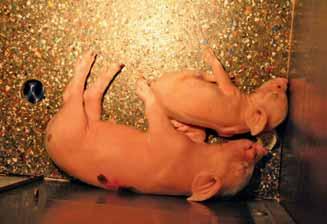
1 minute read
Hear, see, smell, talk
The importance of colostrum
Foreachlitterofpiglets,thesowproducesafixedquantity ofcolostrumcontainingantibodies.Themorepigletsina litter,therefore,thefewerantibodiesareavailableforeach piglet.Thecolostrumsupplyistriggeredduringfarrowing andtheconcentrationofantibodiesdropsveryquickly. Markthefirstbornpigletsand,oncetheyhavefilledtheir bellies,putthembehindapartitiontoallowthelastborn pigletstodrinkextramilk.Pigletsborntogiltsareeven moresusceptible:agilt’simmunesystemisn'tyetfully developedandshehasn’tbeenexposedtoallofthepathogenspresentonthefarm.Plusgiltsthemselvesexcrete morepathogensthananadultsow,puttingthepigletsat greaterriskofinfection.Keepthepigletsofgiltsseparate fromthoseofadultsowsandvaccinatethegiltstomaximisetheirimmunity. Nutrients Energy Antibodies
Advertisement
Lack of disease resistance
Does the piglet lack antibodies? Is this down to the farmer, the piglet or the sow? • Sow hasn’t produced enough colostrum (quantity). • Sow doesn’t have enough antibodies in the colostrum (quality). The level of antibodies in the colostrum depends on the number and • Piglet hasn’t drunk enough and/or has drunk too late. type of pathogens to which the sow has been exposed, the reaction to them and the time of exposure. As a result, older sows often have more antibodies in their colostrum than gilts. Vaccinations for diseases such as circo or influenza may result in a higher concentration of antibodies to those specific pathogens in the colostrum.
LOOK - THINK - ACT What does this thin piglet tell you?
Colostrum is essential. The newborn piglet doesn't have any antibodies of its own. It needs energy, partly to keep itself warm. The protein provides nutrients and antibodies. copyright protected


Crooked back, head down, sunken flanks and a thin rump. This piglet hasn’t drunk enough colostrum. He runs a high risk of succumbing to disease. He doesn’t have enough anti-infection agents in his intestines or antibodies in his blood. As a result, a pathogen could easily flourish in his intestines and infect him. In addition, his intestines won’t develop so well because he lacks growth factors from the colostrum. Finally, he is not receiving the necessary nutrients and will starve, become chilled and then die.






